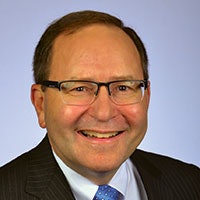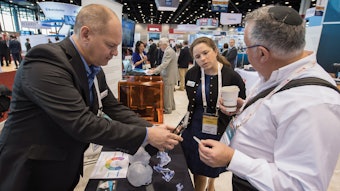Looking ahead
Around the world, 2017 has been a volatile year politically and socially, particularly in the United States. The anticipated systemic change to the healthcare delivery system never materialized, and both patients and their physicians continue to live in a largely unpredictable ecosphere as they try to provide and receive the care they need.
 James C. Denneny III, MD
James C. Denneny III, MD
AAO-HNS/F EVP/CEO
Despite the lack of progress in system reform, there have been several major developments that will prove to have long-term positive implications for physicians and society. The recognition of the urgency in promoting physician and provider wellness has created significant momentum, resulting in resource allocation and escalating program development to promote improvement in this area. The Academy has launched its own wellness campaign and is working collaboratively with multiple organizations to effect change. The federal government has acknowledged that the role of the ever-increasing regulatory burden has contributed to the problem. The government is in the process of rolling back many of these regulations, as well as considering changing the documentation requirements for payment.
Physicians of all specialties have expressed concern over the maintenance of certification (MOC) process as it currently exists. State legislative efforts to limit the use of MOC and potentially alter physician self-regulation have resulted in a consensus opinion that the MOC process is not working for many in its current form. There is already significant movement away from the 10-year exam to a more continuous and practice-relevant system of learning and assessment. The AAO-HNS and the American Board of Otolaryngology released a joint statement addressing this issue, read it on page 10.
In December, the Academy and Foundation completed the first phase of strategic planning that will create our vision for the next three to five years. This consisted of telephone interviews by our facilitator, Paul Meyer, with a broad representation of membership, practice administrators, insurers, corporate supporters, hospital system leaders, specialty society leaders, and past officers. This was followed by a face-to-face meeting including members of the Boards of Directors (BODs), component society leaders, a representative from the Diversity and Inclusion and Ethics Committees, and private practitioners. Robust discussion and participation by both groups produced the input necessary to formulate this vision. The BODs will approve the resultant document, and then the necessary resources will be aligned and allocated to achieve the stated goals.
As you will see from our Annual Report, the Academy and Foundation members and staff have accomplished a great deal this year. Working independently and through coalitions with those of like interests, we have made progress on the legislative, regulatory, and private payer fronts. Our Annual Meeting app was awarded the “Best Mobile App 2016” for the AAO-HNSF 2016 Annual Meeting & OTO Experience at the Trade Show Executive Gold 100 Awards & Summit, held in September 2017. Our clinical data registry, Reg-entSM, was recertified as a qualified clinical data registry, and we submitted a record number of new measures for consideration for 2018. We launched a new journal, OTO Open (already achieving acceptance to the scholarly open access database, DOAJ); initiated our new version of OTO News that each member can personalize based on his or her own needs; were instrumental in inserting patient protection clauses into the over-the-counter (OTC) hearing aid bill; continued to expand content and access for AcademyU®; launched our Future of Otolaryngology and Physician Wellness Task Forces; and held our first International Advisory Board meeting in Chicago, IL. We also have completed the refinancing of our headquarters building in Alexandria, VA. This will free up additional money for projects identified by the strategic plan.
There are a number of critical issues facing our members and patients in the next several years that will begin to come into focus during the upcoming year. It appears unlikely that there will be a widespread federal healthcare reform package, but we hope to be able to chip away at the regulatory burden facing otolaryngologists in all areas of practice. There will be significant activity on the regulatory front and at the state level this year. Highlights include the FDA regulations for OTC hearing aids, MOC legislation, and an increasing level of scope-of-practice bills by Allied health providers. We have already planned our strategy and will be ready to act as these come down. The leadership, staff, and I wish you all a great 2018.













